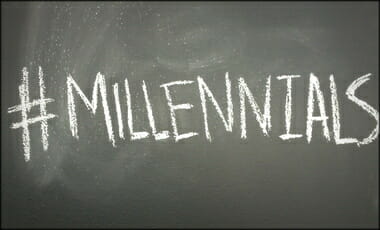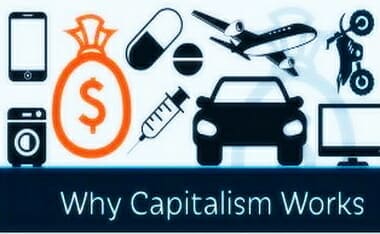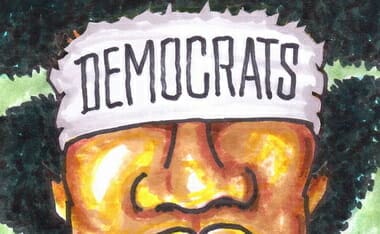Antonia Okafor, a young, single, black woman, recently discovered that’s she’s a racist, sexist, misogynist. How in the world did this happen? None other than Antonia Okafor explains.
Prager U


School Choice (+The Machine)
(Below video description) Poor students deserve just as good an education as rich students, right? So why are so many stuck in failing public schools? Denisha Merriweather, who benefited from school vouchers, explains the problem and the solution.
(Take the pledge for school choice! http://www.schoolchoicenow.com)
(Below video description) Can every child receive a good education? With school choice and competition, yes. The problem? Powerful teachers unions oppose school choice. Rebecca Friedrichs, a public school teacher who took her case against the teachers union all the way to the Supreme Court, explains why school choice is the right choice.
(Below video description) America’s public education system is failing. We’re spending more money on education but not getting better results for our children.
That’s because the machine that runs the K-12 education system isn’t designed to produce better schools. It’s designed to produce more money for unions and more donations for politicians.
For decades, teachers’ unions have been among our nation’s largest political donors. As Reason Foundation’s Lisa Snell has noted, the National Education Association (NEA) alone spent $40 million on the 2010 election cycle (source: http://reason.org/news/printer/big-ed…). As the country’s largest teachers union, the NEA is only one cog in the infernal machine that robs parents of their tax dollars and students of their futures.
Students, teachers, parents, and hardworking Americans are all victims of this political machine–a system that takes money out of taxpayers’ wallets and gives it to union bosses, who put it in the pockets of politicians.
Our kids deserve better.

What Is Fake News? ~ Andrew Klavan
Is Donald Trump correct when he says CNN, The New York Times, and other mainstream outlets report fake news? Commentator and bestselling author Andrew Klavan explains.

The Free Market Works
Did you know that since 1970, the percentage of humanity living in extreme poverty has fallen 80 percent? How did that happen? Arthur Brooks, president of the American Enterprise Institute, explains.
This post is connected with another that is similar in it’s point.
Here, Thomas Sowell writes about the pernicious lie that comes from the Left by speaking about a great book by Arthur C. Brooks from AEI. What prompted me to post this is the indoctrination of our youth in this Facebook post that is horribly wrong in many respects:
“But seriously, to claim that we live in a post racial era is the epitome of absurdity. Although i’m all about forging unity we can’t do so while ignoring the reality of racial injustice, white supremacy, and national oppression in this country. Malcolm X perhaps said it best when he said you can’t have capitalism without racism. The capitalist system thrives off of racism and the division it creates amongst the masses of people. To fight tooth and nail against this order exploitation requires a relentless struggle against racism,white privilege, and all forms of bigotry.”
BONO on the free markets:
Here is Thomas Sowell’s review of Arthur Brooks book… there is the pencil example by Nobel winning economist Milton Freidman as well as an Artur C. Brooks presentation at the end. Econ class 150 is in session:
More frightening than any particular beliefs or policies is an utter lack of any sense of a need to test those beliefs and policies against hard evidence. Mistakes can be corrected by those who pay attention to facts but dogmatism will not be corrected by those who are wedded to a vision.
One of the most pervasive political visions of our time is the vision of liberals as compassionate and conservatives as less caring.
[….]
A new book, titled Who Really Cares by Arthur C. Brooks examines the actual behavior of liberals and conservatives when it comes to donating their own time, money, or blood for the benefit of others. It is remarkable that beliefs on this subject should have become conventional, if not set in concrete, for decades before anyone bothered to check these beliefs against facts.
What are those facts?
People who identify themselves as conservatives donate money to charity more often than people who identify themselves as liberals. They donate more money and a higher percentage of their incomes.
It is not that conservatives have more money. Liberal families average 6 percent higher incomes than conservative families.
You may recall a flap during the 2000 election campaign when the fact came out that Al Gore donated a smaller percentage of his income to charity than the national average. That was perfectly consistent with his liberalism.
So is the fact that most of the states that voted for John Kerry during the 2004 election donated a lower percentage of their incomes to charity than the states that voted for George W. Bush.
Conservatives not only donate more money to charity than liberals do, conservatives volunteer more time as well. More conservatives than liberals also donate blood.
According to Professor Brooks: “If liberals and moderates gave blood at the same rate as conservatives, the blood supply of the United States would jump about 45 percent.”
Professor Brooks admits that the facts he uncovered were the opposite of what he expected to find — so much so that he went back and checked these facts again, to make sure there was no mistake.
What is the reason why some people are liberals and others are conservatives, if it is not that liberals are more compassionate?
Fundamental differences in ideology go back to fundamental assumptions about human nature. Based on one set of assumptions, it makes perfect sense to be a liberal. Based on a different set of assumptions, it makes perfect sense to be a conservative.
The two visions are not completely symmetrical, however. For at least two centuries, the vision of the left has included a belief that those with that vision are morally superior, more caring and more compassionate.
[….]
The two visions are different in another way. The vision of the left exalts the young especially as idealists while the more conservative vision warns against the narrowness and shallowness of the inexperienced. This study found young liberals to make the least charitable contributions of all, whether in money, time or blood. Idealism in words is not idealism in deeds.
Here is Brooks short presentation
Some Later Additions:

The Top 5 Issues Facing Black Americans (UPDATED)
What are the five biggest problems facing black Americans? Where do things like racism and police brutality rank? What about the absence of black fathers? Taleeb Starkes, author of Amazon #1 bestseller “Black Lies Matter,” lists the five. They may surprise you.
- Get Taleeb’s book! Black Lies Matter: Why Lies Matter to the Race Grievance Industry
Get the script in the above video HERE
Another great video that is worth updating the above with is this… and let me say, if there was not a perpetual class of people who were not “victims,” the Democrat Party would cease to exist:

Why Is Healthcare So Expensive?
The Affordable Care Act was supposed to lower healthcare costs, but it has done just the opposite. Why? Because it ignored the realities of how markets work.

What’s Wrong with Socialism? (PragerU Videos and More)
Rafael Acevedo is Founder Director of Econintech, and teaches at the Universidad Centroccidental Lisandro Alvarado in Barquisimeto. He is also Director of Politics of the Venezuelan Freedom Movement.
The longer speech by Rafael Acevedo of which the above is a truncation is HERE. Dinesh D’Souza’s wife ,Debbie D’Souza, a native Venezuelan, did a PRAGERU video as well:
Before delving into the below videos, one should keep in mind that what socialism does is produce giant monopolies. THAT is the theme you see in all socialist countries. Criminal, governemtn, or corporate monopolies — Milton Friedman:
We’ve read and watched the news of Venezuelan society collapsing under the weight of socialism. But how bad is it really? See this firsthand account from documentary filmmaker Ami Horowitz.
Many of America’s legal and illegal immigrants fled nations that were ruined by corrupt politicians and failed government policies. But once here, they support the same things. Why? Gloria Alvarez, Project Director at the National Civic Movement of Guatemala, explains. (Here is her interview on Dennis’ radio program.)
Is Bernie Sanders right? Are people living under socialism better off? Brazil is a good case study. Felipe Moura Brasil, a journalist and Veja magazine columnist, explains how his country has fared under socialism.
What is democratic socialism? What makes it different than regular socialism? Has it been tried? Could it work in the United States? Comedian and political commentator Steven Crowder, host of Louder With Crowder, explains.
Which is better: socialism or capitalism? Does one make people kinder and more caring, while the other makes people greedy and more selfish? In this video, Dennis Prager explains the moral differences between socialism and capitalism, and why anyone who wants a kind and generous society must support one and oppose the other.
Some people are not aware of the following idea… that is, that the Nordic countries can afford many of their wellfare programs in the past BECAUSE they do not pay for their defense. We do. (If you do not know much about this, see my post on “SCANDINAVIAN SOCIALISM“):
Was America once socialist? Surprisingly, yes. The early settlers who arrived at Plymouth and Jamestown in the early 1600s experimented with socialist communes. Did it work? History professor Larry Schweikart of the University of Dayton shares the fascinating story.
“The Progressive Income Tax” is one of those economic terms that gets bandied about, but few actually know what it means or how it works. This tale of three similar brothers with three different incomes (but one shared expense) helps explain the tax system under which we live. Adapted from an article by noted investor and economist, Kip Hagopian, and narrated by actress Carolyn Hennesy of “General Hospital” and “True Blood” fame, this animated story will change the way you think about how you pay your taxes.
Dennis Prager first read from an AP story about Jamie Foxx visiting the death hole known as Venezuela (see the Free Republic post: http://tinyurl.com/z8phhkz). Later in the show he actually gets a call from Caracas, Venezuela. I teared up a bit during the call, as did Prager apparently. Good stuff Maynard!
Here is Dennis’ Facebook comment:
Actor Jamie Foxx will pay no price for his visit with Venezuela President Maduro. A rare combo of doing evil — supporting a brutal dictator — and being stupid. Foxx will get picked up by a limo and go home to his mansion in California while the people of Venezuela starve and wait in line for toilet paper thanks to the socialist revolution.
Leftists don’t care about people, they care about ideas. This is Jamie Foxx. He care doesn’t care about the Venezuelan people. He cares about an idea. He loves the idea of equality. It’s painful. Just painful. Will there be a price paid for such radical stupidity? There is nothing a a left-winger could do that would elicit criticism.
Is capitalism moral or greedy? If it’s based on greed and selfishness, what’s the best alternative economic system? Perhaps socialism? And if capitalism is moral, what makes it so? Walter Williams, a renowned economist at George Mason University, answers these questions and more.
Cultural depictions of capitalism are almost all negative. There’s the Monopoly guy with the top hat and cigar. There’s Gordon Gekko saying, “Greed is good.” And, most recently, there’s the hedonism of the “Wolf of Wall Street”. The message is clear: capitalism is selfish. Socialism, or something like it, is selfless. In fact, the opposite is true. Renowned social critic George Gilder offers this startling insight: capitalism, at its core, is first an expression of altruism; that is, of giving. An entrepreneur can only succeed by satisfying a customer’s need. This is why capitalism, and only capitalism, can create the prosperity that all societies crave and why all other economic prescriptions are doomed to failure.
This election season there’s a lot of talk about corruption, about politicians being “bought and sold”, and about “crony capitalism”. What do those terms mean? Why should we care? Is there a way to reduce corruption and restore our trust in government? Author Jay Cost, staff writer at The Weekly Standard, answers these questions and proposes a solution that every society could benefit from.
Small businesses employ over 57 million Americans. And yet, the government’s taxes and regulations overwhelmingly favor big businesses at the expense of small ones. Why? Find out in this short video.
How big should the government be? And what is its proper role in the daily lives of Americans? The Left and Right have opposite answers.
From transportation to energy, and everything in between, should the government invest money in as many promising projects as possible? Or would that actually doom many of those ventures to failure? Burt Folsom, historian and professor at Hillsdale College, answers those questions by drawing on the fascinating history of the race to build America’s railroads and airplanes.
With the smartest experts and the best economists, could the federal government run the U.S. economy? Could it keep America’s $17 trillion economy going like a well-oiled machine? Steve Forbes, Chairman and Editor-in-Chief of Forbes Media, explains why no one person or group can “run” the economy, and why any attempt to do so can only make things worse.

When Transparency Really Means Tyranny
When you hear the word “transparency,” what comes to mind? Maybe words like openness and honesty. But David French, Senior Writer for The National Review, shows how progressive activists, under the guise of “transparency,” are ruining the lives of many good Americans.

Build the Wall ~ The “Hammer” for PragerU
Can America solve its illegal immigration problem both justly and humanely? Yes, but it requires first building a border wall. Washington Post columnist and Pulitzer Prize-winning author Charles Krauthammer explains why.

Do White Americans Have White Privilege?
What exactly is white privilege? Documentary filmmaker Ami Horowitz finds out as he interviews attendees at the White Privilege Conference in Kansas City.

Is Organic Food Worth the Cost?
Are organic foods really healthier than non-organic foods? Are they better for animals? Are they better for the environment? Bjorn Lomborg, president of the Copenhagen Consensus Center, explains.

“Game of Loans” ~ College Tuition Costs (ECON 101)
There is a law in economics, it deals with artificially propping up businesses, “goods” politicians deem necessary, production, etc. George Gilder notes this in a clip I isolated in an interview:
- “A fundamental principle of information theory is that you can’t guarantee outcomes… in order for an experiment to yield knowledge, it has to be able to fail. If you have guaranteed experiments, you have zero knowledge”
R-PT’s note: this is how the USSR ended up with warehouses FULL of “widgets” (things made that it could not use or people did not want) no one needed in the real world. This economic law enforcers George Gilder’s contention that when government supports a venture from failing, no information is gained in knowing if the program actually works. Only the free-market can do this.
This applies to the real world in many ways, one being the co$t of college. Here is a very short video explaining this well:
OF course, one of my favorite videos of ALL TIME shows how students “benefit” from a subsidizing of college majors when in reality if they had to pay for college themselves it would be (a) cheaper, and (b) they would go into careers other than their majors… like sign flippers and bartenders (or other fields that are hurting):
The great conundrum of the U.S. economy today is that we have record numbers of working age people out of the labor force at the same time we have businesses desperately trying to find workers. As an example, the American Transportation Research Institute estimates there are 30,000 – 35,000 trucker jobs that could be filled tomorrow if workers would take these jobs–a shortage that could rise to 240,000 by 2022.
While the jobs market overall remains weak, demand is high for in certain sectors. For skilled and reliable mechanics, welders, engineers, electricians, plumbers, computer technicians, and nurses, jobs are plentiful; one can often find a job in 48 hours. As Bob Funk, the president of Express Services, which matches almost one-half million temporary workers with employers each year, “If you have a useful skill, we can find you a job. But too many are graduating from high school and college without any skills at all.”
The lesson, to play off of the famous Waylon Jennings song: Momma don’t let your babies grow up to be philosophy majors.
[….]
Kids commonly graduate from four year colleges with $100,000 of debt and little vocational training. A liberal arts education is valuable, but it should come paired with some practical skills.
Third, negative attitudes toward “blue collar” work. I’ve talked to parents who say they are disappointed if their kids want to become a craftsman–instead of going to college.This attitude discourages kids from learning how to make things, which contributes to sector-specific worker shortages….
(HERITAGE)
(For full disclosure, my degree — theology — is one of the lowest paying degrees out there, and the lowest in employment opportunities.) In a short debate of the issue, Peter Schiff notes this “propping up” of useless degrees:
In the above discussion, Diana Carew seems to want jobs created by the government to fit the degrees earned. Otherwise, how would you force the private sector to create such opportunities unless you artificially demand [create] such opportunities? ~ There was zero unemployment in Soviet Russia, but all this “opportunity” collapsed due to economic laws… “this is how the USSR ended up with warehouses FULL of “widgets” (things made that it could not use or people did not want) no one needed in the real world. This economic law enforcers George Gilder’s contention that when government supports a venture from failing, no information is gained in knowing if the program actually works. Only the free-market can do this.” (Peter Schiff gets into the weeds a bit in this video.)
Here is another great PRAGER U video discussing the issue:
This is one of the areas Gary Johnson was correct — supply and demand:
FORBES notes well that most on the Left-end of the spectrum “don’t hate entrepreneurship and innovation,” but that their Econ 101 “part of the brain that deals with economics tends to shut down when discussing sectors like higher education (or healthcare).”
A WASHINGTON FREE BEACON post relates findings from a Federal Reserve Bank (NY) study showing that the federal student loans have increased the cost of college tuition while at the same time college enrollment did not increase:
The expansion of federal student loans has caused tuition prices to increase without increasing college enrollment numbers, according to a report from the Federal Reserve Bank of New York.
The report evaluated student financial data as well as federal student aid programs “to identify the impact of increased student loan funding on tuition.”
According to the report, yearly student loan originations grew from $53 billion to $120 billion between 2001 and 2012, an increase of about 126 percent. During this time frame, average sticker-price tuition nearly doubled, rising from $6,950 to $10,200 in constant 2012 dollars.
The report found that for each dollar of federal aid applied, tuition increased as well.
“We find that each additional Pell Grant dollar to an institution leads to a roughly 55 cent increase in sticker price tuition,” the report says. “For subsidized loans, we find a somewhat larger passthrough effect of about 70 percent.”
[….]
The report makes reference to a hypothesis put forth by William Bennett, the Reagan-era secretary of education. The so-called “Bennett Hypothesis” holds that “increases in financial aid in recent years have enabled colleges and universities blithely to raise their tuitions, confident that federal loan subsidies would help cushion the increase.”
Many have compared the market for postsecondary education to the housing market…. [see video at the top]
Which brings me to finish this post with a humorous look at the hipster douche-bags scratching his or her head in regard to high tuition costs via REASON-TV:
POST-SCRIPT
In an article entitled, Why Is College Tuition Rising So Much? And What Can You Do?, that updates some of the numbers we are dealing with, I found this part sad (and I include myself in this paradox), because often times the young person takes as much money as they can get for the semester rather than get the bare minimum and subsidize the rest with income from work. (Editor’s note: this in part delays adulthood and why matters important to our body politic being expressed in an elementary way at the college level.) Here is the section:
As of 2015, there was over $180 billion in available financial aid for undergraduates. Of that, 67% was in federal grants and loans.
While federal aid has been valuable to those who otherwise would not be able to afford higher education, it has created something of a paradox.
Students accept whatever aid they can get, potentially failing to weigh the long-term financial risk once they earn that degree. The thinking goes that the debt will get paid back in time once they get a well-paying job.
The higher institutions, for their part, understand that with someone else footing the bill, they have very little accountability to the student to keep their costs in line. The institution will get paid no matter their tuition and fees.
Once that student does graduate, the burden becomes theirs.
It’s a heavy one too.
Currently, student loan debt in the U.S. is close to exceeding $1.5 trillion dollars.
Compare that to the over $750 billion owed in credit cards.
Wow.
Mary Bromley, the articles author, while making some good points didn’t include the idea that getting liberal arts degrees is not prepping the student for the shift towards technological needs for the future, nor did she deal with getting degrees that are actually useful in the real world environment. Mind you, that wasn’t the main idea or push of the article and may be a good “part deux,” but one of the main reasons tuition has risen IS BECAUSE the Federal Government is involved… practical ways to keep costs down that are in the article aside.
Likewise, automation (“robots”) will increasingly replace people in a “growing number of jobs, the skills employers are now looking for are technical skills.” But that doesn’t mean people will lose work over the issue, it means that society as a whole will need to change their focus to more technologically minded degrees. Frank Roberts in an earlier article continues:
What specific skills those might be will depend on the specific job you are looking at.
But, basically those skills would include
- Computer skills
- Problem Solving Skills
- Communication Skills
- Finance Skills
- Business Skills
- Science Skills
[In the article much is made of jobs being filled by persons holding bachelor degrees, but, that may merely be a reflection of the over supply of degrees. It should be noted that at the same time a higher percentage of those turned down for work were also bachelor degree holders.]
So a change to practical degrees dealing with the change in society is a requirement. NOT TO MENTION the trades that support families well should be encouraged as well. (Like a master tool maker, a carpenter, or a plumber, etc., these are high paying jobs that society will always need — and jobs like these are more apprenticeship driven rather that degree driven.)
FORBES notes one study that challenges the status quo:
- …Beyond.com, found that a striking 64% of hiring managers said they would consider a candidate who hadn’t gone to a day of college. At the same time, fewer than 2% of hiring managers said they were actively recruiting liberal arts grads….
A person starting out in life should consider all of the above. Their choices made now will have lasting effects — speaking from experience.